2025 China-CEEC Young Science & Technology Talents Exchange successfully held in Ningbo
From May 22nd to 23rd, 2025 China-CEEC Young Science & Technology Talents Exchange was successfully held in Ningbo. This event was supported by the Department of International Cooperation of Ministry of Science and Technology of the People’s Republic of China and the Department of Science and Technology of Zhejiang Province of China, and was organized by the China-CEEC Innovation Cooperation Research Center. It was co-organized by Ningbo University of Technology (China), Albanian Institute for Globalization Studies (Albania), University of National and World Economy (Bulgaria), Zagreb Innovation Centre (Croatia), Aristotle University of Thessaloniki (Greece), Bay Zoltan Nonprofit Ltd. for Applied Research (Hungary), University of Donja Gorica (Montenegro), Science and Technology Park Novi Sad (Serbia), University of Zilina (Slovakia). More than 300 participants attended the activity online and offline, including leaders, experts, scholars and young representatives from the embassies and consulates of CEE countries in China, government departments, universities, research institutions and enterprises in China and CEE countries.
With the theme of “Innovative Youth, Share
the Future”, the Main Activity of 2025 China-CEEC Young Science &
Technology Talents Exchange was successfully held on the afternoon of May 22nd.
Focusing on the topic of “New Opportunities and Pathways for Future-oriented Bilateral
and Multilateral Exchanges and Cooperation among Young S&T Talents”, it
built a platform for young S&T talents exchange and cooperation between
China and CEECs, deepening the understanding and consensus on international
science and technology cooperation.
Budimir Aleksi?, Deputy Prime Minister of Montenegro, Xu Yan, Vice Mayor of Ningbo
Municipal People’s Government, Chang Jian, Deputy Director General of the
Department of European Affairs of Ministry of Foreign Affairs of China, Wang
Xiao, Deputy Director General of the Department of International Cooperation of
Ministry of Science and Technology of China and Lou Xuejun, Deputy Director
General of Department of Science and Technology of Zhejiang Province attended
the activity and delivered speeches.
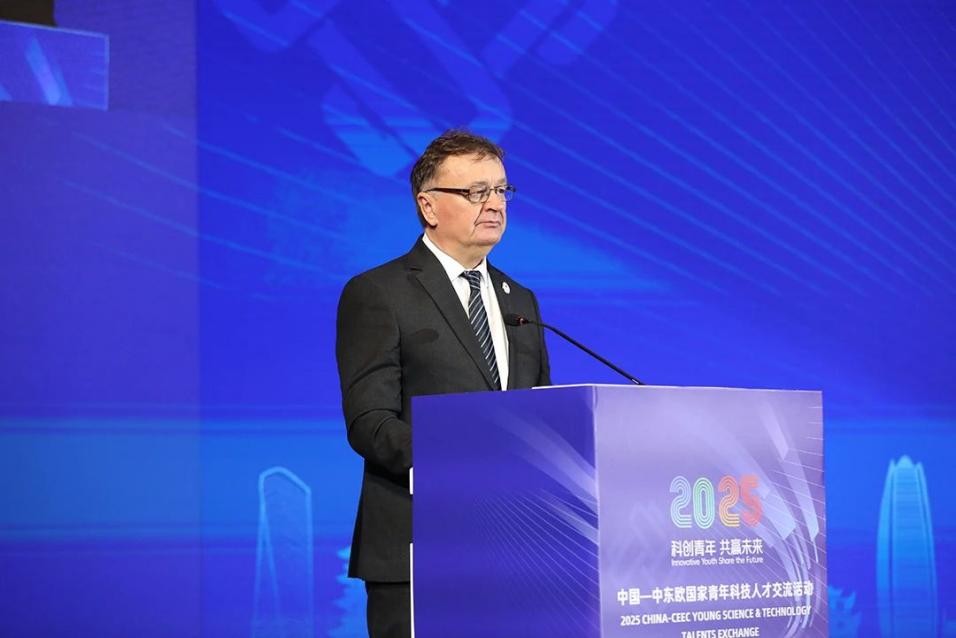
Budimir Aleksi? indicated that this activity provided a safe and trustworthy
opportunity to shape the future cooperation among different stakeholders, once
again highlighting the importance of cooperation between China and CEE
countries. He emphasized that 2025 China-CEEC Young Science & Technology
Talents Exchange is a key mechanism for strengthening cooperation in science,
technology and innovation. This mechanism not only builds a cross-border
collaboration platform for researchers, innovators and experts from various
countries, promotes knowledge sharing and experience exchange, but also advances
the intellectual integration and innovative breakthroughs in the field of
science and technology through deepening the cooperation network among partner
institutions.
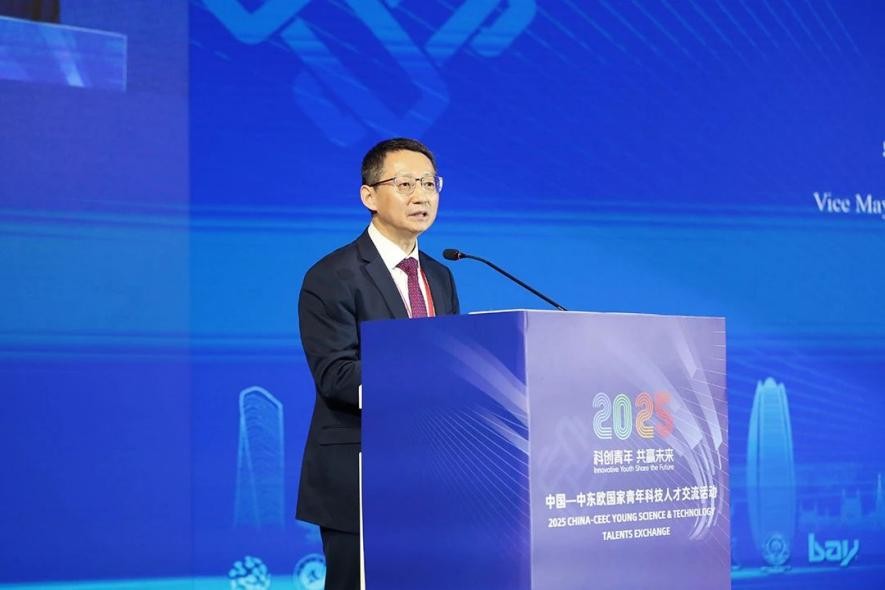
Xu Yan mentioned that Ningbo has been
actively building a science and technology innovation system and a modern
industrial system with local characteristics, constantly promoting the
integrated development of education, science, technology and talents, in order
to deepen the integration of scientific and technological innovation as well as
industrial innovation. It is hoped that all parties will continue to strengthen
innovative research in emerging industries and jointly promote exchanges and
cooperation in science, technology and culture among young people to form a
high-quality innovation ecosystem among regions and continuously promote the
construction of youth-friendly cities.
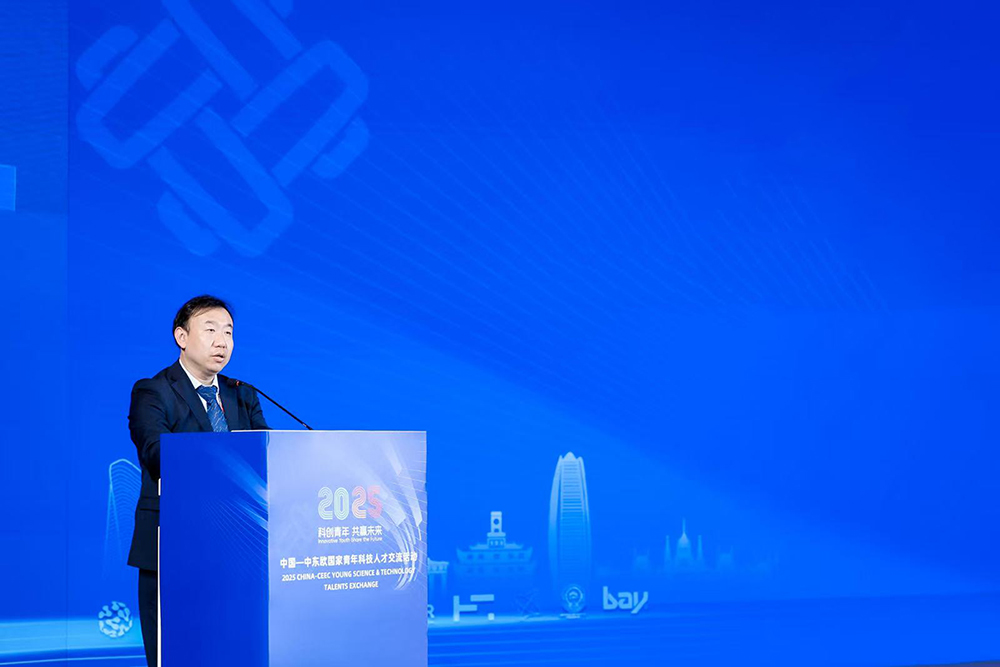
Chang Jian said that China and CEE
countries should build consensus on cooperation, jointly seize the development
opportunities of emerging technologies, and deepen cooperation in scientific
and technological innovation with an open and inclusive attitude. Both sides
should give full play to their complementary advantages in fields such as
digital economy, green development and bio-medicine. Through practical measures
such as technology transfer, project incubation and talent cultivation, they
should promote collaborative innovation among industry, academia and research,
and accelerate the transformation of scientific and technological achievements.
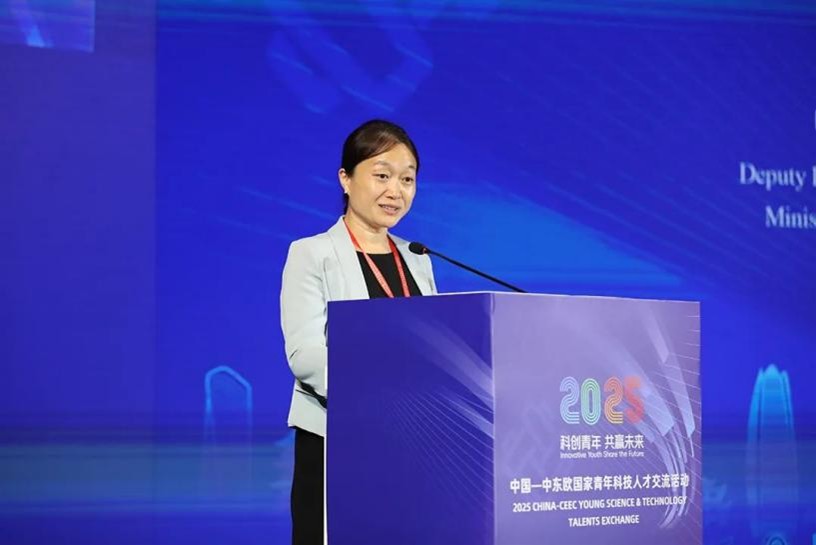
Wang Xiao pointed out that the youth are
not only the vanguard force promoting the development of science and
technology, but also the practitioners deepening international scientific and
technological exchanges. In recent years, China has been constantly optimizing
the open environment for scientific and technological innovation, actively
participating in global science and technology governance, and building win-win
partnerships. China attaches great importance to strengthening scientific and
technological exchanges and cooperation with CEE countries under bilateral and
multilateral mechanisms, and is willing to provide greater impetus for
promoting the economic and social development of all countries and enhancing
bilateral relations and China-EU relations.
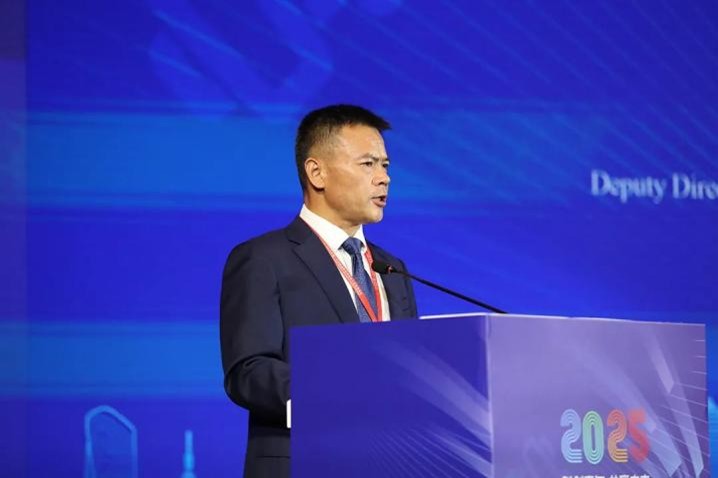
Lou Xuejun emphasized that CEE countries
have always been close partners of Zhejiang province in scientific and
technological innovation development. Zhejiang will continue to encourage and
support scientific and technological personnel from both sides, especially
young talents, to conduct joint research in areas of common concern, promote
cultural and people-to-people exchanges, build a cooperation network, and
promote in-depth and solid scientific and technological cooperation with CEE
countries to achieve high-level mutual benefit and win-win results.
At the event, Fang Xin, a professor from School
of Public Policy and Management, University of Chinese Academy of Sciences, Fellow
of the World Academy of Sciences (TWAS) and Honorary President of the Chinese
Association of Science of Science and S&T Policy Research delivered a keynote
speech entitled “Bolstering International Sci-tech Cooperation and Fostering
Mutual Development”. Mr. Andrzej Czulak, President of Polish Cluster of
Composite Technologies, Poland and Member of Polish Academy of Sciences Committee
on Material Engineering and Metallurgy, delivered a keynote speech entitled “Poland's
Practices in Driving Sci-Tech Innovation Collaboration between EU and the
Central & Eastern Europe Region”. Their speeches offered in-depth discussions
on new models of international S&T cooperation and highlighted the
importance of engaging young scientific talents in global governance.
During the youth dialogue session, five
young science and technology professionals from China and CEE countries engaged
in dialogue on topics including the development of mechanisms for two-way
mobility of young innovative and entrepreneurial talents, cultivation of research
capabilities for youth talents, and opportunities and pathways for cross-border
collaborative innovation in emerging technology fields.
The event featured the Signing Ceremony for
the Collaborative Innovation Network of the China - CEEC Innovation Cooperation
Research Center. Aiming to build a bridge for collaborative efforts between
Chinese and CEEC innovation actors by establishing overseas innovation centers
and connecting domestic and international innovation resources. It will provide
mutual support for personnel exchanges, scientific research, technology
alignment, and industrial incubation between China and CEEC, working together
to create an open innovation ecosystem. Additionally, the event also featured
the Project Signing Ceremony for Innovation Cooperation Initiatives and
released the “2025 China(City)-CEEC Open Innovation Cooperation Index”.
On the afternoon of May 22nd, the
Innovation Cooperation Think Tank Roundtable was held. The discussions centered
on current models and mechanisms of international youth science and technology
cooperation, analyzing the status and challenges of talent mobility.
Participants also shared practical experiences and exemplary international
cooperation cases, providing new ideas for deepening bilateral and multilateral
innovation collaboration among young researchers, scholars, and technology
entrepreneurs from China and CEEC.
At the roundtable, 13 think tank experts
and scholars from China and CEEC—including Albania, Greece, and Hungary—shared
national practices in youth S&T talent cultivation and international
S&T cooperation. Topics included “Case Sharing on China–Romania Facility
Agriculture Technology Cooperation”, “International Talent Collaboration
with Albanian Perspective”, “Bulgaria’s Practice in Nurturing Young
S&T Talents”, “Experiences of the Suzhou Innovation Consortium”, and “Youth in Technological Competition: Risks, Opportunities, and
Practices”. These contributors explored new opportunities and pathways for
bilateral and multilateral youth S&T exchange and cooperation.
On the morning of May 23rd, a
symposium on think tank development was held under the theme “Building
Innovation Think Tanks in the Era of Digital Intelligence”. Three leading
Chinese experts delivered keynote speeches, sharing frontier directions and
practical experiences in think tank development and policy research in the
digital era. Subsequently, three representatives from the Innovation
Cooperation Think Tank Alliance and related institutions exchanged insights on
topics such as opportunities and challenges in think tank development driven by
digital technologies, and the establishment of collaborative mechanisms among
think tanks.
From May 21st to 23rd,
China (Ningbo) Youth Innovation Tour for CEECs was held. Nearly 30 young
scientific and technological talents and representatives from innovation parks
in CEE countries such as Bulgaria, Croatia, Greece, Hungary, and Poland visited
Ningbo in groups based on their specific interests. Their itinerary included
on-site visits to institutions such as Ningbo University, Yongjiang Laboratory,
and leading enterprises such as Geely Automotive Research Institute. During
these visits, they gained insights into Ningbo’s advancements in scientific and
technological innovation, industry integration, and commercialization of
research outcomes. The event also served to deepen mutual understanding,
strengthen friendship, and open up new prospects for international scientific
and technological cooperation. Officials from the Ningbo Municipal Science and
Technology Bureau and the China-CEEC Innovation Cooperation Research Center
accompanied the delegation.